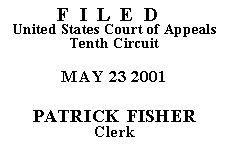

| FRANCISCO J. ROJAS-SANCHEZ, | No. 00-3373
(D.C. No. 00-CV-3126-DES) (D. Kan.) |
The district court ordered responsive briefing from the State of Kansas. See Rojas-Sanchez v. Kansas Attorney Gen., No. 00-3126-DES (D. Kan. June 6, 2000) (unpublished Order to Show Cause). After reviewing the submissions from both parties, the district court denied Petitioner's claims on the merits. See Rojas-Sanchez, slip op. at 4. The district court determined that Petitioner was primarily asserting a state-law claim, i.e., that the state court improperly deviated from its sentencing guidelines, for which the federal courts may not grant relief. See id., slip op. at 3 (citing Estelle v. McGuire, 502 U.S. 62, 67-68 (1991)). The district court then acknowledged that "due process interests are implicated if a state court arbitrarily imposes a criminal sentence not authorized by state law," id. (citing Hicks v. Oklahoma, 447 U.S. 343 (1980)), but found that the sentence imposed by the trial court, which was later affirmed on narrower grounds by the Kansas Court of Appeals, was supported by the record and thus did not constitute arbitrary action.
Petitioner filed a request for a certificate of appealability ("COA") and for leave to proceed on appeal in forma pauperis, both of which were rejected by the district court. Petitioner then filed with this court another request for a COA and for permission to proceed on appeal in forma pauperis. Subsequent to Petitioner's initial filings with this court, the district court reconsidered his request to proceed on appeal in forma pauperis and granted that motion in an Order dated December 20, 2000. See Rojas-Sanchez v. Kansas Attorney Gen., No. 00-3126-DES (D. Kan. Dec. 20, 2000) (unpublished Order).
Because the Petition was filed after April 24, 1996, the effective date of the Antiterrorism and Effective Death Penalty Act ("AEDPA"), AEDPA's provisions apply to this case. See, e.g., Rogers v. Gibson, 173 F.3d 1278, 1282 n.1 (10th Cir. 1999) (citing Lindh v. Murphy, 521 U.S. 320, 336 (1997)). Under the provisions of AEDPA, a state prisoner appealing a district court's denial of habeas relief under §2254 must obtain a COA before we may consider the merits of his claim. See 28 U.S.C. §2253(c)(1)(A), (B). A court may issue a COA "only if the applicant has made a substantial showing of a denial of a constitutional right." See 28 U.S.C. §2253(c)(2). Because the district court denied Petitioner's COA, we must first decide whether to issue Petitioner's requested COA before we may address his claims on the merits. See United States v. Simmonds, 111 F.3d 737, 740-41 (10th Cir. 1997).
We have carefully reviewed the record in this case and, for substantially the same reasons as those expressed by the district court when denying the Petition below, we find that Petitioner has not "made a substantial showing of a denial of a constitutional right" and thus decline to issue a COA in this case. We also hold that Petitioner's motion to proceed on appeal in forma pauperis should be DISMISSED as moot.
This appeal is DISMISSED.
ENTERED FOR THE COURT
David M. Ebel
Circuit Judge
*. After examining appellant's brief and the appellate record, this panel has determined unanimously that oral argument would not materially assist the determination of this appeal. See Fed. R. App. P. 34(a)(2) and 10th Cir. R. 34.1(G). The case is therefore ordered submitted without oral argument. This Order and Judgment is not binding precedent, except under the doctrines of law of the case, res judicata, and collateral estoppel. The court generally disfavors the citation of orders and judgments; nevertheless, an order and judgment may be cited under the terms and conditions of 10th Cir. R. 36.3.
1. On appeal, Petitioner appears to assert that he was not informed by his trial attorney of the possibility of an upward departure from the sentencing guidelines and thus that his plea was not knowing and voluntary. (See Petitioner's Br. at 2, 4.) Petitioner did not make either of these arguments before the district court, however, and we will not address them for the first time on appeal. See Walker v. Mather (In re Walker), 959 F.2d 894, 896 (10th Cir. 1992).